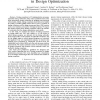663 search results - page 9 / 133 » On the Foundations of Expected Expected Utility |
PODS
2009
ACM
14 years 8 months ago
2009
ACM
Database technology is playing an increasingly important role in understanding and solving large-scale and complex scientific and societal problems and phenomena, for instance, un...
WINET
2011
13 years 2 months ago
2011
Sleep scheduling, which is putting some sensor nodes into sleep mode without harming network functionality, is a common method to reduce energy consumption in dense wireless sensor...
ISQED
2010
IEEE
14 years 2 months ago
2010
IEEE
— Timing exceptions in IC implementation processes, especially timing verification, help reduce pessimism that arises from unnecessary timing constraints by masking non-function...
ALDT
2009
Springer
14 years 2 months ago
2009
Springer
Most work in game theory is conducted under the assumption that the players are expected utility maximizers. Expected utility is a very tractable decision model, but is prone to w...
ATAL
2006
Springer
13 years 11 months ago
2006
Springer
Abstract. We introduce take-it-or-leave-it auctions (TLAs) as an allocation mechanism that allows buyers to retain much of their private valuation information, yet generates close-...

